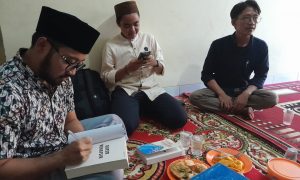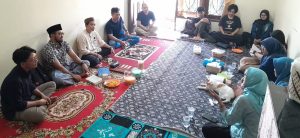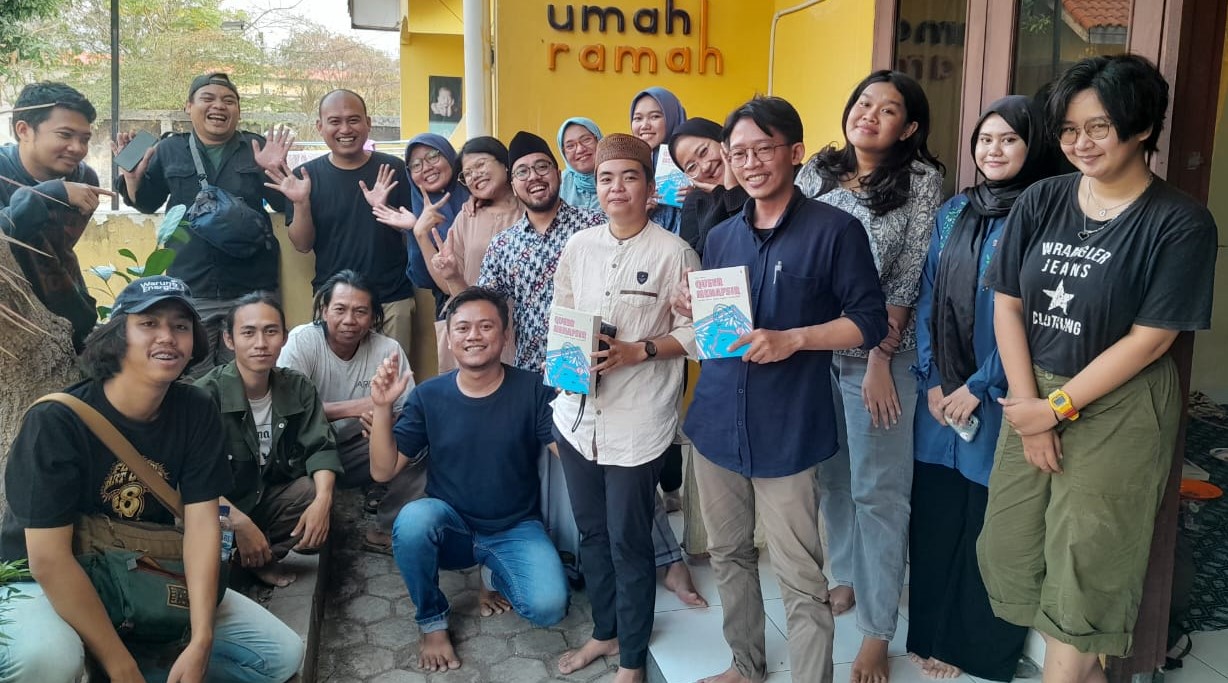By: Ahmad Hadid
The book resulting from the contemplation and theological reflection of a Muslim transman, “Queer Menafsir” was discussed at Umah Ramah, on Friday September 8, 2023. The author of the book, Amar Alfikar, was present at the book discussion along with two other Muslim transmen as discussion starters, Napol Riel (Umah Ramah activist, author of the novella “Keloid“) and Fikri Abdullah Ahmad (“Peduli Nafas” Community).
According to Amar, “Queer Menafsir” departs from the reality of the amount of violence and discrimination experienced by queer friends in Indonesia. Many queer individuals are considered to be violating the nature of humanity and violating God’s will. Therefore, they experience stigma, violence, and some friends even receive death threats.
“In the name of religion, people condemn queers. Even though I believe that religion exists as an answer to oppression, misery and humanitarian disasters. It is not an excuse to oppress, curse, oppress and cause misery,” he said.
For him, all humans, regardless of gender identity, gender expression and sexual orientation, have the same potential and opportunity to approach Him and have the same space to “talk” about Him.
In the book’s foreword, Amar mentions that he wants to reject two big myths related to Queer and Islam. First, the myth that gender and sexual diversity is a product of the West. The second myth is that religion rejects gender and sexual diversity.
“These two myths have grown the roots of inequality and oppression of queer groups or gender and sexual minorities in various aspects. All marginalization and systemic injustice that is perpetuated against queer bodies always stems from religious narratives that are closely linked to ‘single’ interpretations, solely on the basis of heteronormativity,” he said.
In the discussion, Amar also explained that the process of publishing the book was quite difficult. Previously he had sent the book draft to several publishers but it was always rejected. Not because of the quality of the draft, but because the publishers are not ready enough to bear the risks that might be borne in the future.
“Finally I met Gading Publishers. They wanted to publish it. Unexpectedly, this book quickly sold out on the market. Becoming the most sought-after book in 2023,” he said.

Sparking the discussion, Napol Riel expressed his appreciation for the publication of the book. “Queer Menafsir” means a lot to individuals like him. He found references to how queers draw closer to God. When a queer person becomes who they are, millions of eyes see them as individuals who violate nature. They began to be stigmatized, hurted, cursed and persecuted in the name of God, which made them sick, weak, scared and even traumatized for a long time.
“It’s as if queers are God’s flaw when He created them. With that, queers are not worthy to live on God’s earth. From that book I discovered that ‘fitrah’ can also mean ‘sacred’, that every human being was created in a sacred state,” he said.
Fikri Abdullah Ahmad also appreciated the book. For him, “Queer Menafsir” is an authentic book. Written based on self experiences, contemplations and reflections of a queer Muslim.
Fikri also gained new knowledge from the book that non-binary individuals have high spirituality, being individuals who are close to God. According to him, perhaps suffering is what keeps them close to God.
“Even though this book is written in Islamic theology, this book also describes the spiritual process of queer friends. As far as I know, there has been no book that depicts the spiritual process of a queer person. And because this book was written by a queer person himself, it’s very special,” he said.

Fikri noted that another excellence of the book was its friendly diction. The friendliness of the words in the book not only greets queer individuals but also greets readers who are not queer. This quality also strengthens the main message that the author wants to convey.
“The main message is that religion is full of love,” he concluded.
The discussion, guided by Ahmad Hadid, was attended by no less than twenty young adults from various communities in Cirebon. Discussions and questions and answers about queer and Islamic issues took turns enlivening the discussion which ended in the evening.[]
This article was translated by Napol Riel.
